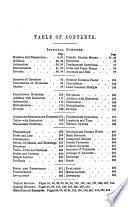 | George Augustus Walton - Arithmetic - 1873 - 348 pages
...NOTE TO THE TEACHER. — The principle given in Deduction 1 is sometimes enunciated thus : " In any proportion the product of the means equals the product of the extremes," which is not true when the terms are denominate numbers ; thus in the proportion 4 pk. : 5 pk. = $... | |
 | Edward Brooks - Arithmetic - 1874 - 352 pages
...Compound Proportion is the comparison of compound ratios. PRINCIPLES OP PROPORTION. PROP. I. — In evert/ proportion the product of the means equals the product of the extremes. DEM. — In the prijportion 2 : 6 : : 4 : 12 we have j = i*y; now if we multiply both these equals... | |
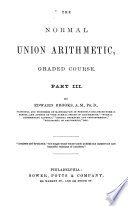 | Edward Brooks - Arithmetic - 1877 - 232 pages
...truths relating to a proportion. They enable us to find any one term when the other three are given. PRINCIPLES. 1. In every proportion the product of the means equals the product of the extremes. In any proportion, as 6 : 3 : : 8 : 4, we have f = £, and multiplying these equals by 4 and 3 we have... | |
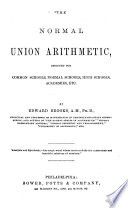 | Edward Brooks - Arithmetic - 1877 - 444 pages
...truths relating to a proportion. They enable us to find any one term when the other three are given. PRINCIPLES. 1. In every proportion the product of the means equals the product of the extremes. In any proportion, as 6 : 3 : : 8 : 4, we have f = J, and multiplying these equals by 4 and 3 we have... | |
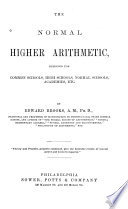 | Edward Brooks - Arithmetic - 1877 - 528 pages
...comparison of two ratios. A proportion is therefore a comparison of the results of two previous comparisons. PRINCIPLES. 1. In every proportion the product of the means equals the product of the extremes. Take any proportion, as 6 : 3 : : 8 : 4. Then we have f = f, and multiplying these equals by 4 and... | |
 | Edward Brooks - Arithmetic - 1877 - 438 pages
...truths relating to a proportion. They enable us to find any one term when the other three are given. PRINCIPLES. 1. In every proportion the product of the means equals the product of the extremes. In any proportion, as 6 : 3 : : 8 : 4, we have f = f, and multiplying these equals by 4 and 3, we have... | |
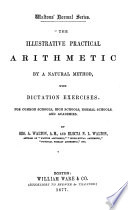 | George Augustus Walton, Electa Nobles Lincoln Walton - Arithmetic - 1877 - 348 pages
...NOTE TO THE TEACHER. — The principle given in Deduction 1 is some, times enunciated thus : " In any proportion the product of the means equals the product of the extremes," which is not true when the terms are denominate numbers ; thus in the proportion 4 pk. : 5 pk. = $... | |
 | Edward Brooks - Arithmetic - 1889 - 482 pages
...to a proportion. They enable us to find any one term when the other three are given. PRINCIPLES. I. In every proportion the product of the means equals the product of the extremes. In any proportion, as 6 : 3 : : 8 : 4, we have j = }, and multiplying these equals by 4 and 3 we have... | |
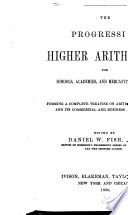 | Horatio Nelson Robinson - Arithmetic - 1875 - 472 pages
...Hence, TI. The square of a mean proportional is equal to the product '' the other two terms. 428. Since in every proportion the product of the means equals the product of the extremes, (4S87, 1), it follows that, any three terms of a proportion being given, the fourth may be found by... | |
 | Minnesota - 1883 - 882 pages
...demonstrate the rule for finding the Lowest Common Multiple of two or more numbers. . 8. Prove that in any proportion the product of the means equals the product of the extremes. x Simplify X 5. Multiply #3 by^/2. Multiply 4^—3 by 2v/— 2. Add^/50 and 6. Extract the cube root... | |
| |